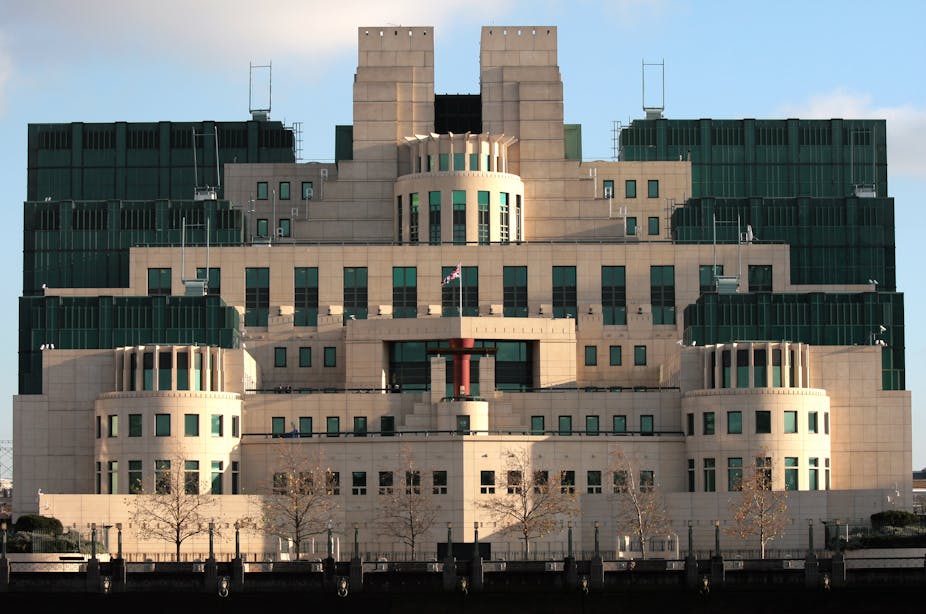The UK’s security and intelligence services face a “technology arms race” against terrorists and criminals’ use of the internet and encryption, the head of MI6, Alex Younger, has said.
The internet and big data, he said, can “combine to our advantage, allowing us to know more about the people we meet”. But their opponents have the same tools – opponents “unconstrained by consideration of ethics and law”.
The implication is clear: give us more powers in order to meet the threat. The British spy chief echoes similar comments from the FBI and CIA, from police chiefs, and now from Europol.
But the stream of revelations stemming from the Edward Snowden documents reveal an altogether different view of surveillance carried out by GCHQ and other agencies. The subsequent inquiry by the Parliamentary Intelligence and Security Committee (ISC) into surveillance practices found reasons to worry about acceding to demands for greater powers, and missed opportunities to hold the agencies to account.
Nothing to see here
The ISC inquiry examined the range of surveillance techniques and how they were used, the scale of use and nature of their breach of privacy, and the legal safeguards surrounding their use.
The committee’s report may be readily characterised as seeking to reassure the public that the immense amount of surveillance does not amount to anything untoward occurring. The committee found GCHQ has “neither the legal authority, the technical capacity nor the resources” for “blanket coverage” of all internet communications. Committee member Hazel Blears MP declared that “the way in which the agencies use the capabilities they have is authorised, lawful, necessary and proportionate”.
On the other hand, there was no shortage of criticism; Privacy International pithily summed it up in saying:
No jargon can obscure the fact that this is a parliamentary committee, in a democratic country, telling its citizens that they are living in a surveillance state and that all is well.
Consolidating power and responsibility
The main recommendation of the report was that the current out-dated, fragmented, over-complex and unclear legislative legal framework should be replaced by a single new comprehensive act, one that “must clearly set out the intrusive powers available to the Agencies, the purposes for which they may use them, and the authorisation required before they may do so”.
A number of intelligence-based activities, such as data-sharing with foreign intelligence bodies, currently have no clear statutory basis and in some cases are likely to be unlawful. Putting surveillance activity on a firmer legal footing is to be welcomed, especially considering that current laws date from before the recent explosion in social media use. The opportunities to gather personal information from data online have exponentially increased; inevitably, legal safeguards and regulations have failed to keep pace.

Snoopers’ Charter?
The concern is that the proposed new legislative framework, while much more comprehensive, still doesn’t address the key concerns raised by what we’ve learned from the Snowden files. To give any reassurance that privacy will be respected and protected, progressively more intrusive surveillance measures should warrant progressively higher levels of authorisation. This would suggest granting a greater role to judges, as a more independent check and balance; instead the committee proposes to give the authority to government ministers.
It has been suggested that this report may pave the way for a so-called “Snoopers’ Charter”, forcing data controllers and ISPs to hand over details of emails, social media messages, texts and voice calls.
In the context of a legislative overhaul, the system of oversight provided by the ISC might also have been expected to come under scrutiny. Yet the fact that it took the Snowden revelations to stir up any action over GCHQ’s bulk collection of data suggests that it was a role that had hardly been rigorously discharged.
Power without control
So the findings of the ISC’s report, and the committee’s tendency to exonerate agencies from wrongdoing seem in harmony with calls for more powers for the likes of MI6, MI5, GCHQ – not in opposition. Whether or not there are extensive statutory guidelines for the agencies’ activities does not in itself create any confidence that mass surveillance is not occurring. Greater transparency, in the sense of providing more information or clarification of the law, doesn’t necessarily demonstrate that powers are not being abused – as indicated by what we’ve learned from the Snowden files.
The fact that the agencies’ opponents are “unconstrained by consideration of ethics or law” does not, and should not, provide an argument that the agencies should be less constrained. Younger accepted that the difference between the agencies and their opponents was the rule of law. So demands for greater powers should concentrate their focus on the constraints that legal reform could impose, because the rule of law is not something that the UK or any of its government agencies should start considering as optional.

